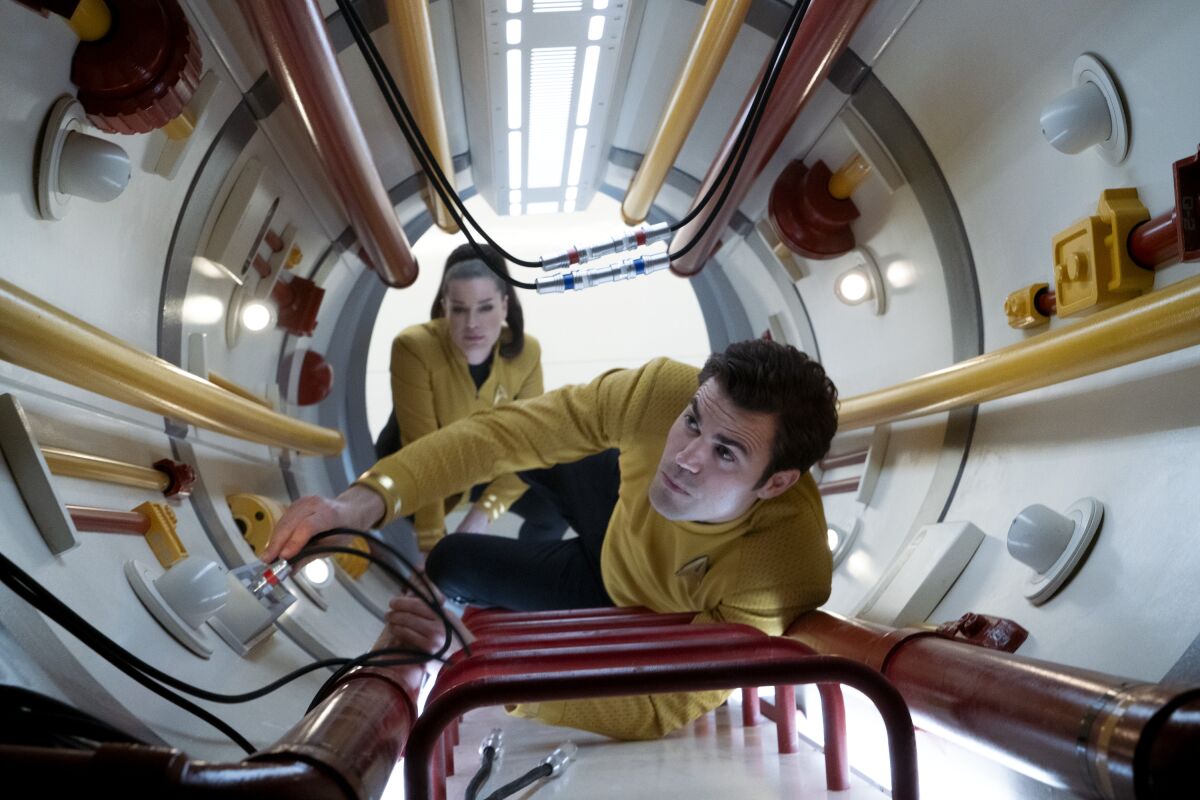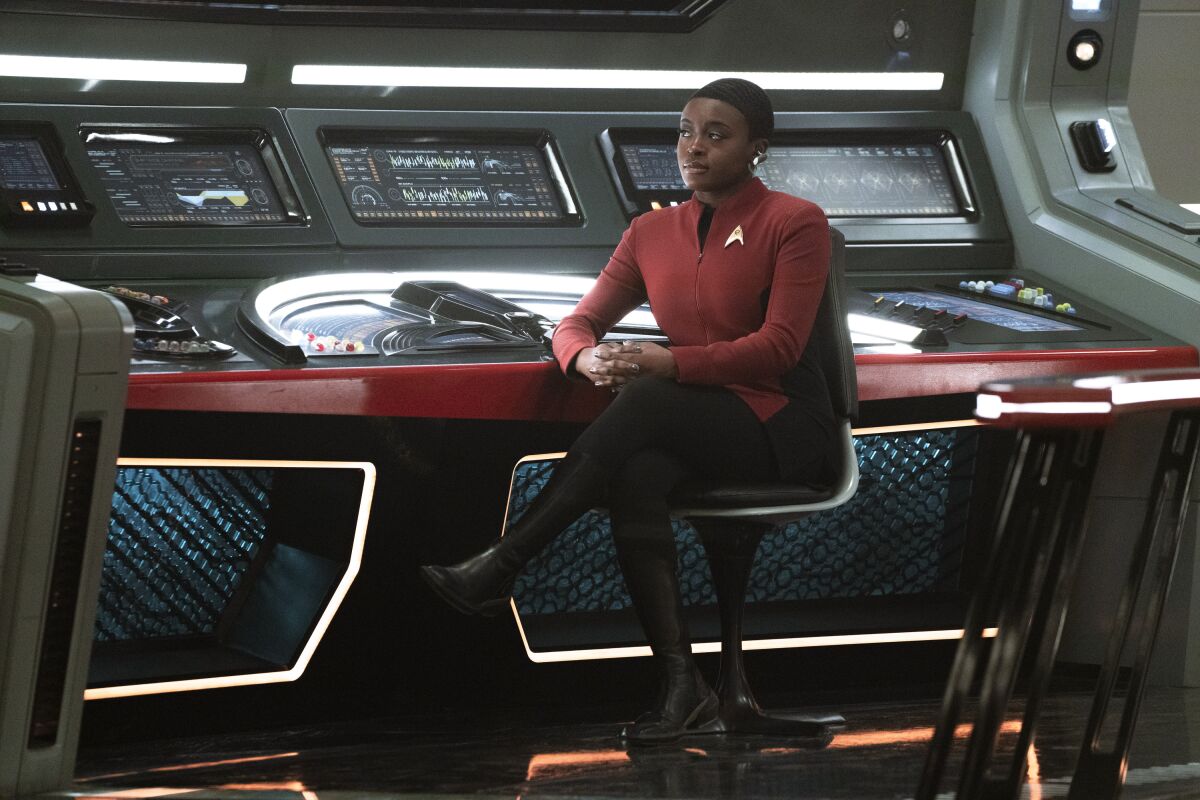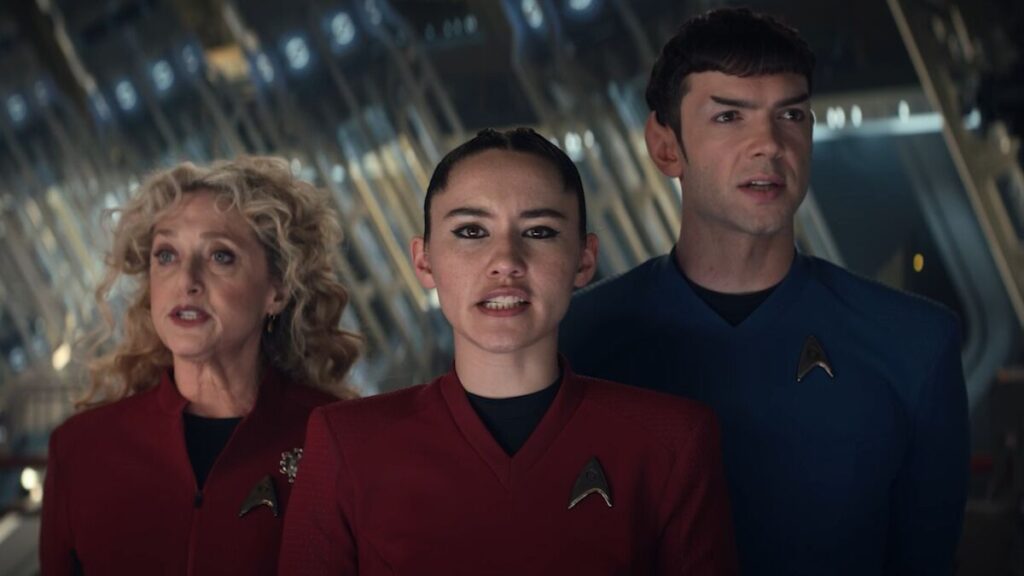This article contains spoilers for “Subspace Rhapsody,” the ninth episode of Season 2 of “Star Trek: Strange New Worlds.”
On Thursday, “Star Trek: Strange New Worlds” (Paramount+) debuted “Subspace Rhapsody,” which has been announced as the first musical episode in the franchise. (Some will, of course, remember Spock strumming on a Vulcan lute and Uhura singing in the original series or Data’s rendition of “Blue Skies” at Will and Deanna’s wedding in “Star Trek: Nemesis.”)
Whether or not one views this as an insult to or a delightful expansion of the series, it has become, if not quite de rigueur, not unusual for a comedy or drama or even a soap opera to get its inner “Rent” on. “Buffy the Vampire Slayer” was perhaps the first show to take this step toward Broadway, but all sorts of series have followed it into the footlights: “Fringe,” “Psych,” “Xena: Warrior Princess,” “Futurama,” “One Life to Live,” “Grey’s Anatomy,” “Community,” “Transparent” and more.
Entertainment and arts reporter Ashley Lee, who knows a lot about musicals but little about “Star Trek,” and television critic Robert Lloyd, who knows quite a bit about “Star Trek” and less about musicals (at least any written after 1970), got together to discuss the episode.
Ashley Lee: Because I love musical theater, I’m always intrigued when TV shows take the risk to make a musical episode. The task of creating original songs for the screen is already tricky enough, especially in a way that invites along the show’s weekly audience and still moves its stories forward. And then there’s the task of asking the actors to perform them, whether or not they’ve ever sung or danced onscreen before. It’s an episodic experiment that, over the years, only some shows have gotten right.
I admittedly put on the musical episode of “Star Trek: Strange New Worlds” with low expectations because, outside of “Little Shop of Horrors,” putting sci-fi to song hasn’t historically been so harmonious (R.I.P., “Spider-Man: Turn Off the Dark”). Even though I had no prior connection to any of these characters, I found “Subspace Rhapsody” to be a pleasant surprise.
I loved how the songs, written by Kay Hanley and Tom Polce of the ’90s alt-rock band Letters to Cleo, poked enough fun at the oddity of suddenly breaking out into song without insulting the TV tradition. And I found it hilarious that the episode, directed by Dermott Downs and written by Dana Horgan and Bill Wolkoff, deemed “confessing highly personal, emotional information” a legitimate security threat. (When you think about it, such can definitely be true in the real world!)
I’m surprised that, after all these years, this is the first ever “Star Trek” musical episode. Robert, as a longtime fan of the franchise, were you open to the idea?
Carol Kane as Pelia, left, Christina Chong as La’an and Ethan Peck as Spock in “Star Trek: Strange New Worlds.”
(Paramount+)
Robert Lloyd: In sci-fi fandom, any unusual step is bound to raise some hackles. But as a TV critic since before flat screens, I have seen at least a few of these “special musical episodes” mounted in otherwise nonmusical series. I suspect the impetus came not from viewer demand but from the producers or the writers, who are always looking for something new to entertain the audience and, not incidentally, themselves and was seized upon happily by cast members, many of whom will have had backgrounds in or at least a love of musical theater, even if only from their high school production of “Guys and Dolls” (which I mention because it was produced at my high school — not with me).
History shows there’s no sort of show more likely than another to take on this challenge, but of all the “Star Trek” series, “Strange New Worlds” is perhaps the one most amenable to it. It’s got a strong vein of humor, and, as a highly episodic show, it’s subject to — in fact, embraces — tonal shifts from week to week. This season has been particularly … goofy? Two weeks prior to “Subspace Rhapsody,” they aired a crossover with the animated spinoff “Star Trek: Lower Decks,” in which cartoon characters became flesh and fleshly characters cartoons.
I thought it was smart to give the musical element of the show a “scientific” rationale — if the usual “Trek” technobabble — with the Enterprise overwhelmed by feedback from a substance fault into which, on the inspiration of Carol Kane’s Pelia, they sent a playlist in an attempt to communicate musically.
And it’s quite appropriate for a season full of romantic subplots, including Ethan Peck’s Spock — who, you must know, is more about logic than feeling — having a thing with Jess Bush’s Nurse Chapel, and security chief Noonien-Singh’s (Christina Chong) awkward reunion with a young James T. Kirk (Paul Wesley), who doesn’t recall their relationship from an alternative timeline. (That bit may have made no sense to you, Ash.) Appropriately, the story makes it clear that heightened emotion is what causes the characters to sing — which is, of course, the underlying rationale of music theater.
All else aside, how did the music strike you? It was odd that although the music they fed into the fault was the “Great American Songbook” — the standards of early to mid-20th century popular song, often written for musicals — none of the songs in the episode were actually modeled on that tradition. Not much in the way of Jerome Kern or Rodgers and Hart there. It all sounded post-Andrew Lloyd Webber to me.

Rebecca Romijn as Una and Paul Wesley as James T. Kirk in a scene from “Star Trek: Strange New Worlds.”
(Michael Gibson/Paramount+)
Lee: Haha, you’re right! While I did appreciate the use of Cole Porter’s show tune “Anything Goes” as a very literal cue to the audience of the storytelling “rules” ahead, many of the tunes were more contemporary than Golden Age. The one that’s most “vintage” in style was the sweet duet “Connect to Your Truth,” when Una Chin-Riley (Rebecca Romijn) shared key leadership advice with Lt. Kirk.
Regarding the romances, I admittedly became deeply invested in these will-they-won’t-theys by the end of their musical numbers. I particularly loved La’an Noonien-Singh‘s song “How Would That Feel,” about contemplating vulnerability; it was like an introspective, angsty version of “Company’s” “Being Alive” in the musical style of “Wicked” (and is a promising preview of her music — Chong just released a debut EP). And the stark differences in genre between Spock’s brooding electropop ballad “I’m the X” and Nurse Chapel’s Amy Winehouse-esque fellowship celebration “I’m Ready” definitely maximized the tension amid their miscommunication.
Beyond those, the opening number titled “Status Report” was so strong — a perfect example of musicalizing a familiar routine of the world (think “Opening Up” from “Waitress” or “Good Morning Baltimore” from “Hairspray”) — and the choral, orchestral rendition of the show’s main title was a delight. Also, the double meaning of communications officer Nyota Uhura’s anthem “Keep Us Connected” was very satisfying and, in my opinion, only scratched the surface of Celia Rose Gooding’s vocal abilities (she earned a Tony nomination for her performance in “Jagged Little Pill”).
If “Star Trek” ever officially makes the leap to the stage, I imagine these three songs in particular would transfer well. (Though if so, I’m gonna need a full expansion of that brief interlude of autotuned, rapping Klingons.) Bravo to Hanley and Polce for writing all the music and lyrics of this episode; while many have attempted it over the years, only a few pop stars and rockers have successfully walked the tightrope of writing effective and entertaining stage musicals (e.g., Cyndi Lauper, David Byrne and Elton John).
Overall, did you enjoy “Subspace Rhapsody”? Was the first musical episode of the franchise worth the wait?

Celia Rose Gooding as Uhura in “Star Trek: Strange New Worlds.”
(Michael Gibson / Paramount+)
Lloyd: I can’t say I was waiting for it, but I certainly enjoyed it. I’m all about nutty “Star Trek,” going back to “The Trouble With Tribbles,” and also found it a really effective way to embody the emotional crises being faced by “Strange New Worlds’” eminently likable characters. Certainly, the cast bursting into song (and the occasional dance), with music dropping in from … somewhere, is no more nonsensical than about, oh, a hundred things that have happened to the various starship crews over nearly six decades.
But let me ask you, did it make you liable to keep watching the series? (No judgment.)
Lee: Robert, these subplots were so genuinely compelling, even when concisely moved forward in song, that I’ll likely start this series from the beginning and continue on past this episode. Plus, I’m so intrigued by Lt. Kirk and Noonien-Singh’s romance in that alternate timeline!
‘Star Trek: Strange New Worlds’
Where: Paramount +
When: Anytime, starting Thursday

